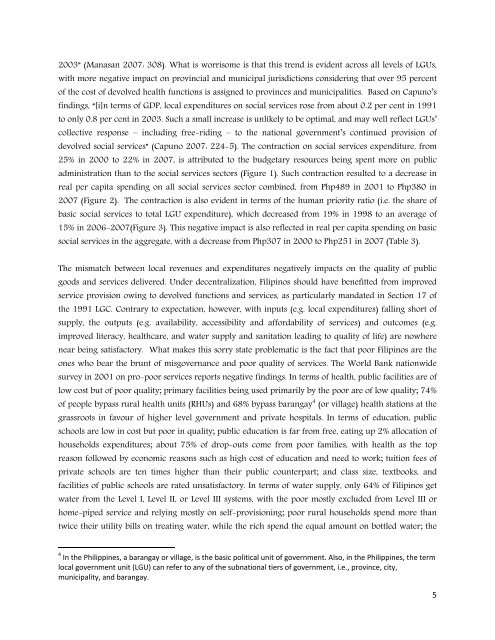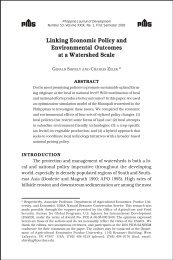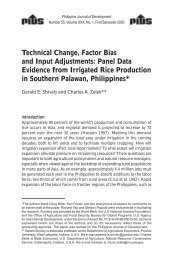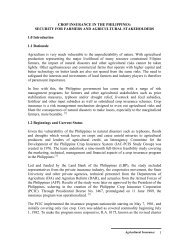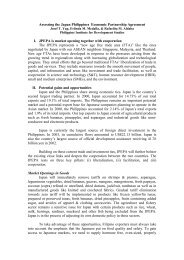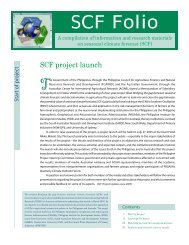Triangulation Framework for Local Service Delivery - Philippine ...
Triangulation Framework for Local Service Delivery - Philippine ...
Triangulation Framework for Local Service Delivery - Philippine ...
Create successful ePaper yourself
Turn your PDF publications into a flip-book with our unique Google optimized e-Paper software.
2003” (Manasan 2007: 308). What is worrisome is that this trend is evident across all levels of LGUs,<br />
with more negative impact on provincial and municipal jurisdictions considering that over 95 percent<br />
of the cost of devolved health functions is assigned to provinces and municipalities. Based on Capuno’s<br />
findings, “[i]n terms of GDP, local expenditures on social services rose from about 0.2 per cent in 1991<br />
to only 0.8 per cent in 2003. Such a small increase is unlikely to be optimal, and may well reflect LGUs’<br />
collective response – including free-riding – to the national government’s continued provision of<br />
devolved social services” (Capuno 2007: 224-5). The contraction on social services expenditure, from<br />
25% in 2000 to 22% in 2007, is attributed to the budgetary resources being spent more on public<br />
administration than to the social services sectors (Figure 1). Such contraction resulted to a decrease in<br />
real per capita spending on all social services sector combined, from Php489 in 2001 to Php380 in<br />
2007 (Figure 2). The contraction is also evident in terms of the human priority ratio (i.e. the share of<br />
basic social services to total LGU expenditure), which decreased from 19% in 1998 to an average of<br />
15% in 2006-2007(Figure 3). This negative impact is also reflected in real per capita spending on basic<br />
social services in the aggregate, with a decrease from Php307 in 2000 to Php251 in 2007 (Table 3).<br />
The mismatch between local revenues and expenditures negatively impacts on the quality of public<br />
goods and services delivered. Under decentralization, Filipinos should have benefitted from improved<br />
service provision owing to devolved functions and services, as particularly mandated in Section 17 of<br />
the 1991 LGC. Contrary to expectation, however, with inputs (e.g. local expenditures) falling short of<br />
supply, the outputs (e.g. availability, accessibility and af<strong>for</strong>dability of services) and outcomes (e.g.<br />
improved literacy, healthcare, and water supply and sanitation leading to quality of life) are nowhere<br />
near being satisfactory. What makes this sorry state problematic is the fact that poor Filipinos are the<br />
ones who bear the brunt of misgovernance and poor quality of services. The World Bank nationwide<br />
survey in 2001 on pro-poor services reports negative findings. In terms of health, public facilities are of<br />
low cost but of poor quality; primary facilities being used primarily by the poor are of low quality; 74%<br />
of people bypass rural health units (RHUs) and 68% bypass barangay 4 (or village) health stations at the<br />
grassroots in favour of higher level government and private hospitals. In terms of education, public<br />
schools are low in cost but poor in quality; public education is far from free, eating up 2% allocation of<br />
households expenditures; about 75% of drop-outs come from poor families, with health as the top<br />
reason followed by economic reasons such as high cost of education and need to work; tuition fees of<br />
private schools are ten times higher than their public counterpart; and class size, textbooks, and<br />
facilities of public schools are rated unsatisfactory. In terms of water supply, only 64% of Filipinos get<br />
water from the Level I, Level II, or Level III systems, with the poor mostly excluded from Level III or<br />
home-piped service and relying mostly on self-provisioning; poor rural households spend more than<br />
twice their utility bills on treating water, while the rich spend the equal amount on bottled water; the<br />
4 In the <strong>Philippine</strong>s, a barangay or village, is the basic political unit of government. Also, in the <strong>Philippine</strong>s, the term<br />
local government unit (LGU) can refer to any of the subnational tiers of government, i.e., province, city,<br />
municipality, and barangay.<br />
5


